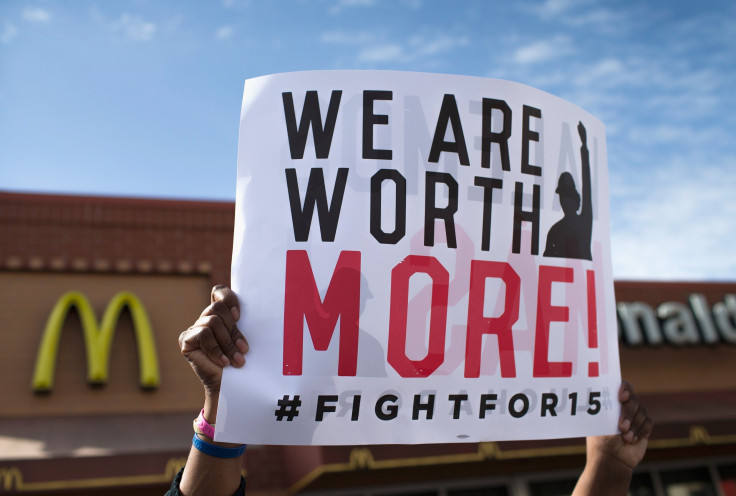McDonald’s Under Fire For Labor Violations In Landmark Joint Employer Case

Opening arguments kicked off Thursday in a long-awaited National Labor Relations Board case that could, for the first time ever, put McDonald’s on the hook for labor violations committed by the company’s franchised restaurants. It all hinges on this question: whether McDonald’s is a so-called joint employer of workers at its franchisees, the independently-owned businesses that make up 90 percent of the company’s roughly 13,000 stores in the U.S and employ the vast majority of its 420,000 workers.
In addition to making the company more liable for labor violations, a decision from the NLRB that McDonald’s is a joint employer would open the door for a union formed by workers at franchised stores to bring the parent company to the bargaining table. Such a ruling could also set a precedent for other fast-food franchises, according to industry observers and legal experts.
The dispute dates back to November 2012, when McDonald’s workers first went on strike as part of the Fight For 15, a protest campaign funded by the Service Employees International Union (SEIU) demanding higher pay ($15 an hour) and union recognition. During the original walkout and in subsequent protests, union organizers alleged that employers illegally retaliated against sympathetic workers. In response to a string of complaints filed by organizers at the NLRB, the general counsel of the labor board then announced it aimed to hold both McDonald’s franchisees and the parent company liable for the alleged violations.
The case essentially consists of two parts: First, the general counsel of the NLRB is seeking to demonstrate that McDonald’s is a joint employer; second, that the company and its franchisees committed violations of labor law, known as “unfair labor practices.” At the hearing in New York City Thursday, lawyers for the government began by tackling the joint employment question first.
In his opening statement representing the general counsel for the NLRB, Jamie Rucker aimed to demonstrate the extent to which McDonald’s controls the employment practices of its franchisees. Rucker painted a picture of constant and deep monitoring, from manuals issued to franchise owners that cover workers’ job classifications and duties to computer software that makes recommendations about wages, hours, hiring and firing.
According to the manuals, Rucker said, workers are encouraged to spend 20 to 25 seconds on order taking, 12 to 16 seconds on assembly, and 10 to 16 seconds on presentation.
The company also uses what it calls “operations consultants” to ensure business owners are following their franchise agreements with McDonald’s. Unlike with traditional management consultants, franchise owners are not free to ignore advice from McDonald’s consultants, Rucker said. If stores fail to follow certain directions, he said, they risk not having their contracts renewed.
“The level of control this gives McDonald’s over its franchisees is very fine-grained and specific,” Rucker said.
Representing McDonald’s, William Goldsmith blasted the case as politically motivated, brought by the NLRB’s general counsel at the “behest of the SEIU.” He said that “independent franchises alone” control the core terms and conditions of employment at their stores. If any business owners are found to have violated labor law, they bear responsibility, not McDonald’s, he said. “They’re the ones who should be on the hook for those decisions.”
McDonald’s does not set wages, benefits, work schedules or any other core employment practices at franchise-operated locations, Goldsmith argued. He acknowledged it might be “possible” that certain operations consultants crossed the line from giving “advice” into providing “direction” but that any such behavior is not evidence of the sort of wide-reaching employment control alleged before the NLRB. Even if the company wanted to engage in such sweeping control, he said, “it’s not possible. It’s a fundamentally absurd proposition.”
“Franchising has been especially beneficial to women and minorities,” Goldsmith continued, citing figures that show these groups make up more than 50 percent of McDonald’s workforce. Instead of attacking the company, he said, the general counsel of the labor board “should be holding up McDonald’s as a paradigm of how franchising should work.”
Lawyers representing franchise owners named in the NLRB’s complaint also testified Thursday, urging the board not to determine McDonald’s to be a joint employer. They said their clients were able to successfully manage their businesses independently of the corporate manuals and software referenced by the board’s general counsel.
If the NLRB ruled against McDonald’s in the case, the resulting consumer backlash would hurt franchise owners, argued Robert Brody, a lawyer representing McDonald’s franchisees in New York City. The fate of franchise owners is tied closely to the lasting appeal of the brand, he explained: “McDonald’s protects the brand like a mother protects a cub.”
Brody also said that he believed the general counsel “wants to kill franchising.” He concluded by urging the administrative law judge, Lauren Esposito, to dismiss the charges and “keep the American Dream alive.”
The highly fact-intensive case is slated to continue next week with testimony from McDonald’s officials, including from an operations consultant. Either side can appeal an eventual ruling from the board’s administrative law judge, sending it to the agency’s five-member board in Washington. Some observers say the case could take years before being resolved.
Last August, the National Labor Relations Board broadened its definition of joint employment. Experts say that could play in the favor of the union in this case.
© Copyright IBTimes 2024. All rights reserved.





















